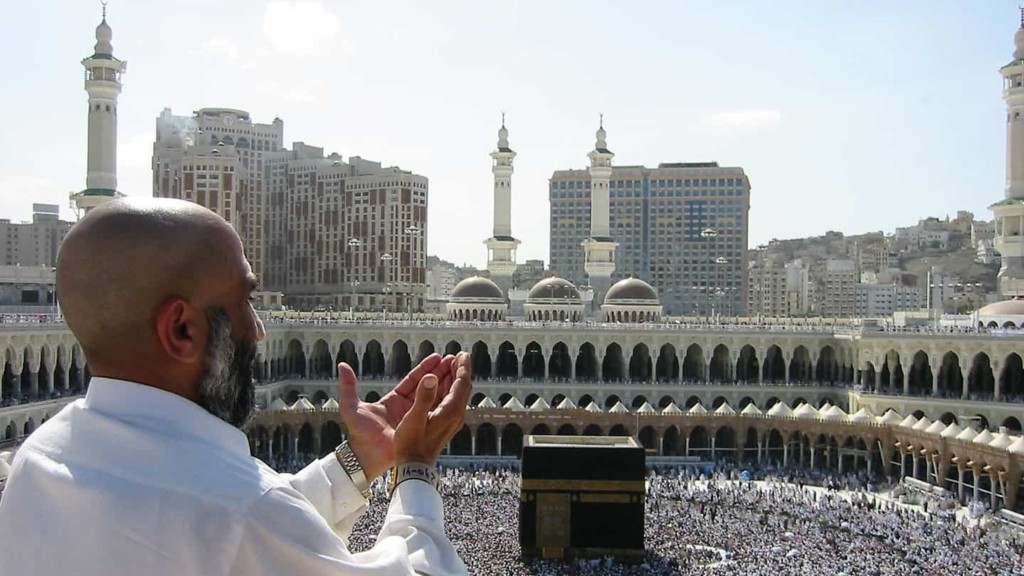Politics v pilgrimage: some Muslims call for Saudi haj boycott

Report by the Thomson Reuters Foundation, August 9, 2019.
As millions of Muslims don robes and flock to Mecca for haj, a small counter movement to boycott the pilgrimage in protest at Saudi Arabia’s politics has won limited support online.
Although the numbers are dwarfed by the 1.8 million who have arrived in Mecca for Friday’s haj, more than 100 Muslims from Australia to Tanzania are contributing to a Twitter hashtag #boycotthajj in response to Saudi Arabia’s political record.
They cite its role in the war in Yemen, stance on human rights and unequal treatment of women among top concerns.
“#BoycottHajj is an important discussion for Muslims to have. It is about being critical and recognising the atrocities that the Saudi regime commits against fellow Muslims,” Mariam Parwaiz, a public health doctor in New Zealand, said on Twitter.
For Ella, attending haj now would be incompatible with Islam’s wider obligations to stand up to injustice.
“It’s Saudi foreign policy and the oppressive nature of Saudi society that’s stopping me,” the 28-year-old British academic told the Thomson Reuters Foundation.
“It’s not me saying I don’t want to go — I would love to be able to fulfill my religious obligation. But for as long as that would mean being complicit in violence, I won’t do it.”
A Saudi-backed coalition has waged war in Yemen since 2015 and aid workers say some 24 million people — almost 80% of the population — will likely need humanitarian assistance in 2019.
The Gulf kingdom also faces heightened scrutiny over its human rights record after last year’s murder of journalist Jamal Khashoggi by Saudi agents.
And women — who have won some high-profile rights — face a barrage of male controls in this socially conservative kingdom.
Riyadh has urged Muslims to focus on worship, not politics.
A Saudi official dismissed the boycott as “unwise” and said its small number of backers stood in sharp contrast to the fact that more pilgrims chose to visit Mecca each year, with countries seeking ever larger haj quotas.
“Those people are trying to politicise haj,” he told the Thomson Reuters Foundation. “Haj is separate. Haj has nothing to do with all this — this is a spiritual trip.”
Riyadh was seeking “political solutions” in Yemen, he said, and “witnessing considerable change” on women’s rights.
Holy guardian
Every able-bodied Muslim who can is supposed to go on haj at least once in their lifetime and Saudi Arabia takes great pride in its role as the guardian of Islam’s holiest sites.
It also sees haj as key to expanding tourism and moving away from an economic dependence on oil, with haj generating billions of dollars in revenue for the kingdom.
Some boycott supporters said they do not want their money to go towards a government whose policies they abhor.
Ella, who preferred not to use her full name, said she had noticed a “real shift” in her generation, which refuses to divorce Saudi politics from faith.
“We’re asked much more strongly to behave ethically and to stand against oppression…than to go on haj.”
De facto ruler Crown Prince Mohammed bin Salman was praised after taking power in 2017 for loosening social restrictions.
The kingdom swept aside a ban on women driving and earlier this month made provisions to erode the male guardianship system, a key plank in restricting female autonomy.
The ministry in charge of the haj said the number of international pilgrims had risen 5% this year compared to last and that Saudi Arabia did not “pay any attention to malicious calls or media campaigns seeking to disturb the haj,” the official said.
For Elisabeth Kendall, senior research fellow in Arabic & Islamic Studies at the University of Oxford, the boycott was unlikely to gain much traction, with the world’s growing Muslim population now estimated at 1.8 billion people.
“First and foremost, haj is a duty for all Muslims to perform at least once in their lives, if they have the physical and financial means to do so — whether one agrees with the policies of the Saudi regime is thus irrelevant.”
Others take a different view.
“Muslims should boycott haj, because to do so only feeds the regime,” said Ani Zonneveld, president of Muslims for Progressive Values, a U.S.-based nonprofit organisation.
“(They) will only contribute to the devastation and starvation of the Yemeni people, empower the very regime that has imprisoned many women and human rights advocates.”
For teacher Sohaib El-Nahla, speaking by phone from Mecca, “haj is the journey of a lifetime” with no link to politics.
“In our understanding haj is a divine invitation to the sacred precincts,” El-Nahla told the Thomson Reuters Foundation.
“Boycotting haj to a Muslim would be the same as applying a boycott to their own religion and their own spirituality.”
Featured image: Pilgrim in supplication at the Sacred Mosque. By Ali Mansuri (CC BY-SA 2.5) via Wikimedia.
Source: The Thomson Reuters Foundation, the charitable arm of Thomson Reuters. Reporting by Adela Suliman; editing by Lyndsay Griffiths.





